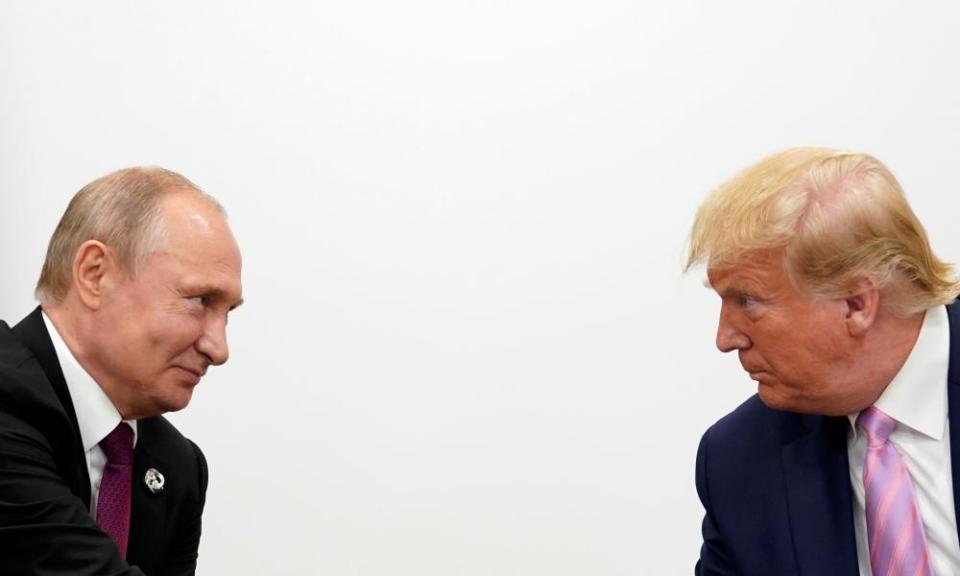Release of Trump-Putin transcripts needs Russian approval, Kremlin says
The Kremlin has said it would need to give permission for Donald Trump to release details of his one-on-one conversations with Vladimir Putin, a likely target of Democratic lawmakers in an upcoming impeachment inquiry.
Speaking with journalists on Monday, the Kremlin spokesman, Dmitri Peskov, said that the release of summaries or transcripts of the two leaders’ discussions – details of which have remained a closely guarded secret – is “only possible with the mutual agreement of both sides”.
“Diplomatic practice does not allow for the publication [of these records],” Peskov said, according to the Interfax news service. “So if the Americans send us signals, then we’ll discuss it.”

Trump and Putin have held at least 11 phone calls since Trump’s inauguration, according to the Kremlin website, and also have met several times in person with only a translator present. Trump’s affinity for Putin and his rejection of Russian meddling in the 2016 US presidential elections have brought additional scrutiny to those conversations. The White House has released little or no information about some of the conversations.
Adam Schiff, the chair of the House intelligence committee who is leading the impeachment inquiry, said in a television appearance this weekend that he would seek access to Trump’s conversations with Putin as part of a growing investigation into his alleged abuse of presidential powers to aid his re-election campaign.
“I think the paramount need here is to protect the national security of the United States and see whether in the conversations with other world leaders – and in particular with Putin – that the president was also undermining our security in a way that he thought would personally benefit his campaign,” Schiff said on NBC’s Meet the Press.
It is not clear how the Kremlin could stop Trump from complying if the documents are subpoenaed by Congress, although the White House could claim the documents are protected by executive privilege.
Peskov’s remarks can also be seen as trolling, creating the perception that Trump is compromised by his relationship with the Kremlin in a show of contempt for current US political attitudes toward Russia.
Democrats have launched the impeachment inquiry into Trump’s attempts to pressure the Ukrainian president, Volodymyr Zelenskiy, into investigating his political rival Joe Biden ahead of the 2020 election.
Related: Rudy Giuliani: Ukraine sources detail attempt to construct case against Biden
According to records of a telephone call and a whistleblower complaint by a member of the intelligence community, Trump blocked military aid to Ukraine before repeatedly telling Zelenskiy on a 25 July call to speak with his personal lawyer Rudy Giuliani about investigating Biden’s son’s business dealings in Ukraine.
According to the whistleblower complaint, the Trump administration sought to restrict access to records of his conversation with Zelenskiy by putting them on a system used to hold highly sensitive and classified material. The call did not contain any information pertinent to national security, the whistleblower complaint said, but was potentially embarrassing for Trump.
White House officials also sought to limit access to Trump’s conversations with Putin, CNN reported on Friday, refusing to circulate transcripts of at least one telephone call among senior staff. The White House also did not make available transcripts of calls between Trump and the Saudi crown prince, Mohammed bin Salman, after the murder of the journalist Jamal Khashoggi, according to the news station, in an effort to prevent leaks.

